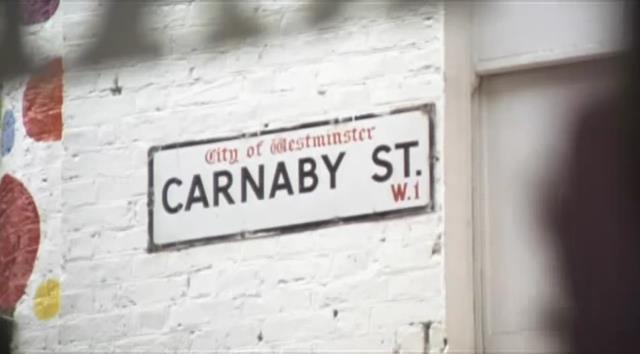Girl with Green Eyes
The major
analysis is by Richard Donner in Twinky, the minor by Mike Nichols in Working
Girl.
Neither is
anything to the purpose in a great Irish joke about a
“cosmopolitan” writer with a French name, member of “the
Trinity pack”, plunked down on a farm outside Dublin, he meets a shopgirl
and begins an affair, her priest-ridden folks object forcefully, his grass
widow in New York sends him a plane ticket, directed with genius by Davis, “a
curious blend of folk caricature and nouvelle
vague artiness” (Sarris in The American
Cinema, who further says, “Desmond Davis has been sliding downhill
since”).
Smashing Time

Two girls from
the North make the scene in London, “you,
lookin’ s’ hopelessly square and unwith it and that,
I ask you.”
Just before Midnight Cowboy (dir. John Schlesinger)
and just after The Great Race (dir. Blake
Edwards) for the great reckoning in a small room with aerosol sprays and
squeeze bottles.
Pilloried
in the papers by a critic-photog strictly from Bow
bells, “switched-on” robot statuary with a Sten
gun, the lot.
Cf. the world ten times over (dir. Wolf
Rilla), Cool It, Carol! (dir. Pete Walker), and to be sure Antonioni.
“I don’t
like that fella, he makes me quite
glad I’m just a pussy.”
This is of course
right up Edwards’ street, he returns the compliment in The Party. The great cameraman achieves
with Manny Wynn a perfect match in color for Rilla’s monochrome (Larry
Pizer). A rare musical in which the songs are voiceover
commentary on the action.
Tushingham and
Redgrave take the town, with Michael York, Ian Carmichael, Anna Quayle, Murray
Melvin (looking ever s’ much like Shelley) et al.
The
fab world of English kitsch, everything “Jabberwocky”,
Too Much, “every layabout in Chelsea.”
“‘er! With ‘im!!”
Pie fight at Sweeney Todd’s, a homo retro établissement,
Sarris on Edwards, “the last spasm of action painting in the Western
world,” a fashion to die for.
Demolition for
larks, “are you the fella on the telly?” Creative recording in the hired studio (cf. The
Patsy, dir. Jerry Lewis), hired publicity etc.
|
I can’t sing but I’m young, can’t do a thing but I’m young. I’m a foo-oo-ool but I’m coo-oo-ool —don’t put me down! |
“I’ve
even had tea with the Prime Minister, still
nobody takes me seriously.” The whole scene centrifuged, fuses blown and
all.
“The
idea... should have been resisted at all costs” (Andrew Sarris, The American Cinema).
Bosley
Crowther of the New
York Times, “apparently well-intended”. Variety, “an amazing memory of Hollywood film.” Roger
Ebert (Chicago Sun-Times), “quickly
becomes tiresome.” TV Guide, “nothing
more than slapstick, and worn-out slapstick at that.” Britmovie, “hilarious
satire”. Craig Butler (All Movie
Guide), “an engaging romp”. Halliwell’s
Film Guide, “no style or sympathy.”
Measure for Measure
Vienna lace cuffs
and the folly of foibles put to rest and somnambulating, a variant of King Lear. The tortuous declaration of
love in high places, a clown’s censure, the fragmentary features of a
total disorganization of any society, wrought to judgement by a nicety-knowing
playwright, and dealt with any discretion advised by the Beeb by Peter McEnery,
Frank Middlemass, Tim Pigott-Smith, Kate Nelligan, and Kenneth Colley as the
great Duke.
Clash of the Titans
The humorous
title describes a device learned by Perseus from the Stygian Witches, that of
beheading Medusa in order to destroy the Kraken threatening Andromeda. The
screenplay is carried out by Davis as cinematic representations of Greek myth
seen as thought made into language.
It is, in fact, a
companion piece to Jason and the
Argonauts (dir. Don Chaffey).
The great Ray Harryhausen displays his art of stop-frame animated sculptures in
scrupulous depictions of a two-headed dog, giant scorpions, Medusa herself (a
particularly dreadful creature, well-prepared in concert with Davis), the
winged horse Pegasus, etc.
Davis exhibits
genius in the casting, Ursula Andress as Aphrodite, Maggie Smith as Thetis,
Claire Bloom as Hera, Laurence Olivier as Zeus, etc.
Ordeal by Innocence
There is a
certain relationship to Robert Montgomery’s Your Witness. A seaside view of England
similar to Murder Ahoy (dir.
George Pollock) and Break in the Circle (dir.
Val Guest), with a pleasant jazzy score by Dave Brubeck.